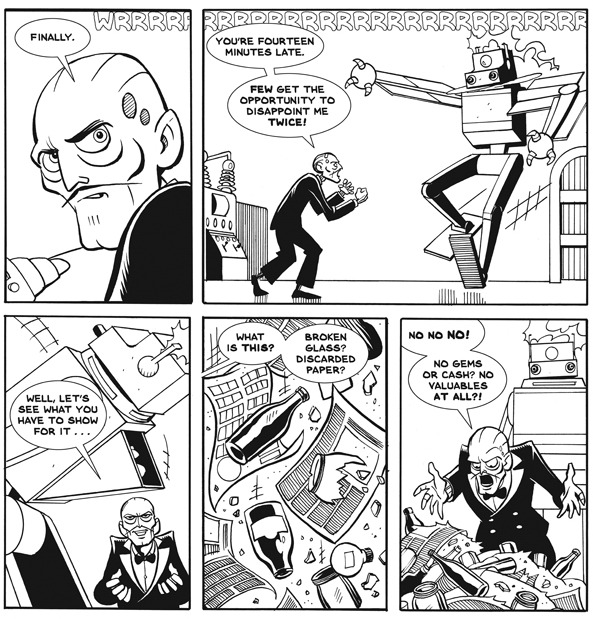Virtually every year, there's a high-concept Eisner nominee that utterly baffles me. In 2009, it was Speak No Evil, the undocumented-immigrant parable where a guy has a hole for a mouth, and last year, it was the weird Ant Comic. This year, it's probably going to be Brian Fies' The Last Mechanical Monster.
It's based on Fleischer Studios' 1941 animated Superman short "The Mechanical Monsters," probably best known as the first time, in any medium, Clark Kent stepped into a phone booth to change clothes. The first few pages of Fies' comic look like screen shots of the original cartoon. After that intro, the the story picks up 60-plus years later. We're already in some strange territory: a fan fiction is now in Eisner Award consideration. Only ... this isn't fan fiction about Superman or Lois Lane; it's about the villain.
We're also informed that "The Mechanical Monsters" is in the public domain (a factoid that took me back to when I first watched the cartoon, on a VHS purchased for cheap at Woolworths that stopped functioning after two viewings). That gives the comic an added layer of trickiness, but maybe this is as legit an adaptation as, say, CBS's Elementary.
The author, Brian Fies, has won before: His webcomic, Mom's Cancer, in 2005 was the first-ever recipient of the Eisner's Best Digital Comic Award. So what I had immediately pegged as a longshot is probably one of the frontrunners to take home the prize. The Last Mechanical Monster also chronicles the frailty of the human condition; this time, the comic is about old age.
After Superman defeats the machines, the Inventor is sent to prison for a long time. He's been denied a chance to live his life, and he wants his revenge. When he gets back to the real world, he immediately gets back to trying to revive his army of Mechanical Monsters. (And I'm assuming no superhero interference this time. I don't think even Superman can leap copyright law in a single bound.)
Old age, though, is something of an advantage. His cranky megalomania is seen as the senile grumblings of an elderly coot. The prison must have been a walled-off time capsule, because everything in the outside world is new and confusing, and people are willing to help him at first to work through his cluelessness about modern gadgets and eBay. As failure of mad science make him more irritable, people get less patient.
After a series of grumpy dismissals, a bus driver who's been going out of his way to drop the Inventor in the woods (where he keeps his villain lair) requests just one thing: that the Inventor simply say, "I appreciate you." It's a pretty drastic step for a guy who's been maintaining a list for people to kill once his robots are activated. It works like a charm, however, and it helps calm an irate shop owner who's unknowingly been providing parts for the Inventor's robotic kill squad.
The robots are probably not going to be that much of a threat, anyway. The Last Mechanical Monster is a pleasant comic overall, set in a humble small town where everyone is assumed to be decent ... including the titular Monster, who doesn't quite work as the Inventor planned.
Looking back, the decision to open the comic with screenshots of the Fleischer cartoon was rather clever. Sure, it's quirky. The tone and art style jarringly shift from superhero action to slice-of-life vignettes of small-town living. It does, though, get you in the right mood. You start the comic transported back to your own days as a young child, gazing in wonder at animated adventures of superheroic feats. The black-and-white world is the familiar one, filled with the mundane routine of real life. Maybe you don't want the Inventor to succeed in conquering the world ... but can you really blame him for wanting to relive the days when he was slugging it out with Superman?


